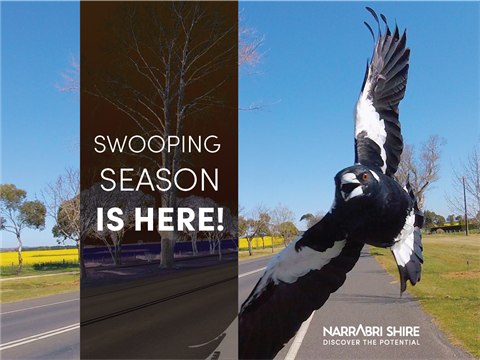Magpie Swooping Season for 2023
Published on 01 September 2023

As spring arrives, residents are advised to be cautious and take necessary precautions while venturing outdoors in areas known for magpie nesting.
Magpie swooping is a natural behaviour during breeding season, where magpies become protective of their nests and may swoop at perceived threats, including pedestrians, cyclists, and even pets. While these interactions can be intimidating, it's important to remember that magpies are an integral part of the local ecosystem and play a vital role in controlling insect populations.
Please note that Magpies are native birds protected by the Biodiversity Conservation Act 2016. This makes it against the law to move the birds, kill the birds, collect their eggs, or harm their young.
To ensure the safety of both residents and magpies during this season, council offers the following tips:
- Be Aware: Keep an eye out for magpie warning signs that the council will place in known swooping areas. These signs will help you identify areas where magpies are more likely to swoop.
- Avoid Eye Contact: If you encounter a swooping magpie, it's recommended not to make direct eye contact with the bird, as this can be perceived as a threat. Instead, try to keep your movements calm and steady.
- Protective Gear: Wearing a hat or helmet can provide some protection against swooping magpies. You can also attach zip ties or cable ties to your helmet, as the bright colours may deter magpies from swooping.
- Alter Your Route: If possible, consider changing your walking or cycling route during the swooping season to avoid known magpie nesting areas.
- Travel in Groups: Magpies are less likely to swoop when faced with a group of people. Travelling with friends or family can help reduce the risk of being swooped.
- Carry an Umbrella: Holding an open umbrella above your head can help create a physical barrier between you and the magpie, reducing the chances of a swoop.
- Be Patient: Magpie swooping season typically lasts a few weeks to a couple of months, depending on the region and local conditions. Remember that this behaviour is temporary, and the birds are simply protecting their nests.
By following these guidelines and understanding the reasons behind magpie swooping behaviour, residents can coexist with these native birds during their breeding season while minimising the potential for conflicts and injuries.
For further information on dealing with Magpies during the breeding season visit the NSW Environment and Heritage website.